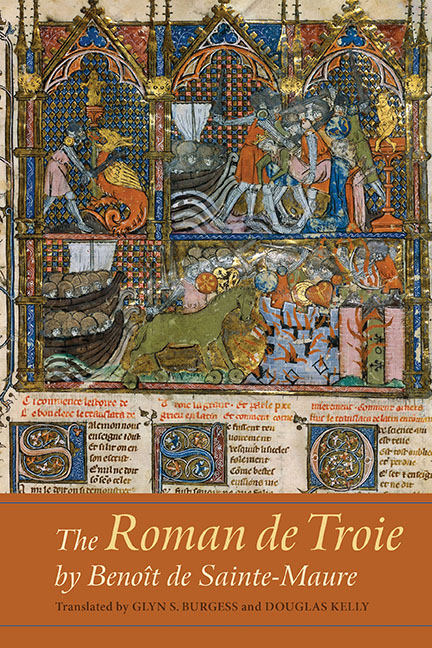Book contents
- Frontmatter
- Contents
- Dedication
- Preface and Acknowledgements
- Introduction
- A Note on the Translation
- Outline of the Roman de Troie
- The Roman De Troie
- Part One Causes and Effects
- Part Two The Trojan War
- Part Three Settling Scores and Surviving
- Part Three Settling Scores and Surviving
- Appendix I Notes on Some Common Words in the Roman de Troie
- Appendix II Manuscripts of the Roman de Troie
- Bibliography
- Indexes of Personal and Geographical Names
- Index of Personal Names
- Index of Geographical Names
- Miscellaneous Endmatter
Part Three - Settling Scores and Surviving
from Part Three - Settling Scores and Surviving
Published online by Cambridge University Press: 15 February 2018
- Frontmatter
- Contents
- Dedication
- Preface and Acknowledgements
- Introduction
- A Note on the Translation
- Outline of the Roman de Troie
- The Roman De Troie
- Part One Causes and Effects
- Part Two The Trojan War
- Part Three Settling Scores and Surviving
- Part Three Settling Scores and Surviving
- Appendix I Notes on Some Common Words in the Roman de Troie
- Appendix II Manuscripts of the Roman de Troie
- Bibliography
- Indexes of Personal and Geographical Names
- Index of Personal Names
- Index of Geographical Names
- Miscellaneous Endmatter
Summary
Dispute over the Palladium
This destruction of Troy took place as I have told you and as I found it in my Books. Beginning now, you will hear how the Greeks also encountered great obstacles along with immense and terrible catastrophes. You will now hear what their individual destinies were. When I have told you these things, you will not claim that any other people ever experienced greater suffering. As we read it, all of them came to grief and perdition. (26591–602)
The Greeks were perplexed and at odds as to whom the Palladium should go, given that Achilles was dead. If Achilles had been alive, no one, great or small, would have put forward any disagreement, unjust claim or opposition that stated he should not have it. But now Ajax Telamon claimed that it was right and reasonable for him to have the Palladium, since, as he put it and argued, he was so valiant and of such standing, and, moreover, he had already aided the members of the host on many occasions with his sharp, naked sword. In addition, he had satisfied their hunger so many times when they were in such misery and lacked nourishment, and he had also sustained so much combat. Diomedes too asked for it, pleading and demanding that all of them should consider his claim very carefully, for, if they listened to reason, no one had a greater right to it than he did. Therefore, the Palladium belonged entirely to him. He stated clearly and claimed that he had maintained the great effort and been victorious in deadly battles, rescuing them many times, so much so, indeed, that, if he alone had not defended them, they would have been forced to withdraw in anguish and dismay. None of the Greeks had endured as much as he had. If they were to decree that he was not to get the Palladium, this would weigh more heavily on him than anything else, although he would have to accept his loss. With these claims (as we read) arose great clamour and heated disputes. King Telamon became very angry and began to speak with great arrogance.
- Type
- Chapter
- Information
- The Roman de Troie by Benoît de Sainte-MaureA Translation, pp. 369 - 414Publisher: Boydell & BrewerPrint publication year: 2017

